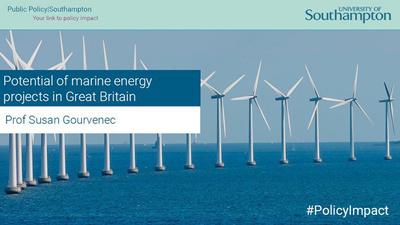Chair in Emerging Technologies, Susan Gourvenec, provides consultation response to BEIS ‘Call for Evidence on the Potential of Marine Energy Projects in Great Britain’

The UK Government’s Department for Business, Energy & Industrial Strategy (BEIS) recently ran a consultation with a call for evidence on the Potential of Marine Energy Projects in Great Britain.
The call sought views on the potential of marine energy technologies (including floating offshore wind, wave and tidal) in Great Britain, to feed into the forthcoming energy white paper.
Susan responded to two of questions posed in the Call for Evidence:
- How specific technologies expect to reduce costs to the point where they can be commercially competitive with other renewable and low carbon generation options.
- Where does the scope for cost reductions arise, and what scope for innovation exists in the sector? What trajectories for cost reduction are realistic and feasible – at a project level but also across the relevant sector?
If specific emerging marine technologies are unlikely to be able to compete with other marine technologies for income based on the electricity they generate; what forms of support could move the technology towards commercialisation in the short term?
Susan’s response emphasises that (i) consideration of emerging technology solutions for seabed survey, station-keeping, and monitoring are critical in reducing capital expenditure (CAPEX) and operating expenditure (OPEX) of marine renewable energy systems, particularly for floating arrays as developments move farther from shore and into deeper waters, and (ii) a regenerative philosophy and distributive economic model, such as set out in Raworth’s Doughnut Economics framework, provides an alternative lens through which to assess cost and rebalance apparent competitive advantage between different marine renewable energy systems to support selection of the most appropriate solution for a particular development or region.
Read Susan’s full response to the consultation on the Public Policy Southampton website, here.